This is my complete guide on helping you with two things,
- Help with determining if you were a rebound
- Showing you how to deal with the pain
Really though there are four things that I want to talk about in depth (and the best part is that no one out there seems to be covering these things.)
- The triad of rebound traits
- Answering why your ex started a relationship with you if they weren’t over their ex
- Determining if their feelings for you were real
- How long the pain you are feeling might last
Let’s jump right in!

What Are Your Chances of Getting Your Ex Boyfriend Back?
Take the quizThe Triad Of Rebound Traits
One of the significant questions I often encounter regarding rebound relationships is how to determine if you are in one (or if you were in one.)
Generally, there are three factors you’ll want to consider.
I refer to these as my “triad of rebound traits.”
They include:
- They moved on to you within two months of ending a relationship.
- Your relationship with them lasted less than six months.
- They’ve either returned to their ex or moved on to someone new.
Let’s take a brief moment to go through each of these traits.
Factor #1: They moved on to you within two months of ending a relationship
Why two months?
Well, I was doing extensive research for an article on monkey branching, which will be particularly relevant shortly.
Anyways, when examining monkey branching, one of the questions I posed to myself was,
“What is the length of time from when they break up with their ex and move on to you? How many months are we looking at?”
The truth is that it’s sort of half and half.
- Half the time, they actually start talking to their new person while they are still in a relationship with the current person.
- The other half of the time, they’ll break up with that person and then go through a bit of a grieving process or a neglecting process, if you will.
We’ll talk a little bit more about that shortly.
So, I wanted to be conservative and say two months because I wanted to suggest that if you have gone through a breakup and moved on to someone else within a two-month period, then there’s a potential risk of being a rebound.
However, you also need to consider a few other factors.
Factor #2: Your relationship with them lasted less than six months
Why six months?
When I conducted an audit, the general mark for rebound relationships was 5.2 months.

What Are Your Chances of Getting Your Ex Boyfriend Back?
Take the quizInterestingly, this is very similar to the time it takes for our success stories to see success after a breakup.
What I always found intriguing is the actual lack of legitimate research out there.
I’ve looked everywhere for any kind of research on how long the average rebound relationship lasts and have not found anything reputable. So, in order for me to come up with that 6ish month mark I literally had to go online, visit forums like Reddit or Quora, and start examining people’s responses to the question,
“How long did your rebound relationship with your ex last?”
I then compiled these responses in a database and averaged them.
So to reiterate, at the time of the writing of this article there is no formal research out there for this, which is somewhat shocking to me.
Yes, there is research out there for breakups, but rebound relationships, specifically their typical duration, always seem to get the short end of the stick. I don’t know why that is, but we’ve done the best with what we could, and six months is what we came up with.
Factor #3: They’ve Either Returned To Their Ex Or Moved On To Someone new
Let’s delve a little into the concept of ‘monkey branching.’
Monkey Branching: When someone, while still in a relationship with you, begins planning to move on to someone else.
Typically, one thing I’ve noticed about individuals who readily enter rebound relationships is the predictability of their behavior.
They’ve done this before and often, it’s a coping mechanism for them.
However, the predictable nature of their actions is something that people often overlook.
So, you’re going to be looking for two distinct things.
- First, you’re going to examine their behavior after they break up with you. How quickly do they move on? Do they shift their attention to someone you were potentially worried they had feelings for while they were still with you?
- The second thing I want you to pay attention to is the history of their relationships. If you look at their past, has it just been a series of rebounds?
If you’re evaluating your relationship and you notice this triad that I’ve mentioned, and all three factors apply – they moved on to you very quickly, you were only together for about six months, and they’ve moved on from you quite swiftly – then it’s very likely that you were a rebound.
Why Your Ex Started A Relationship With You If They Weren’t Over Their Ex?
There could be many reasons, but what often comes to mind are the similarities between the narcissistic abuse cycle and the avoidant death wheel.
If you’re not familiar, I have these two insightful graphics that I frequently post on my website.
The narcissistic abuse cycle, a well-known graphic NOT created by me,
It illustrates how a narcissist often idealizes, then devalues, discards, and hoovers, repeating this cycle over and over again.
Then there’s the avoidant death wheel, which describes how avoidants jump from relationship to relationship.

What Are Your Chances of Getting Your Ex Boyfriend Back?
Take the quizWe’ve found that most of our clients, the exes they’re trying to get back or move on from, tend to have avoidant attachment styles.
There’s a striking similarity between these two different graphics.
(I even went as far as color coding my graphic to lay on top of the abuse cycle)
In both cases, it’s all about transitioning from one phase of a relationship to the next, or in some cases, jumping from one person to the next.
Now, I’m not suggesting that your ex is a narcissist and that this is why you’re in so much pain and why they’ve rebounded from you.
Research consistently shows that only 5% of the population is considered narcissistic.
So, it’s very unlikely that your ex is narcissistic just because you potentially think you were a rebound.
However, what is very likely, to the tune of about 70%, is that your ex has an avoidant attachment style.
I’m not convinced that it’s a situation where they broke up with their ex, moved on to you, and were always still thinking about their ex.
Often, this approach to relationships has always been how they’ve coped with relationships. If you look closely at the avoidant death wheel, there’s a strong connection to rebounds.
There are eight stages to it.
- They start off wanting someone to love them
- They find you and believe that their problems are over.
- But then something about your attachment styles doesn’t mesh. They start noticing some worrying things. Usually, this is anxiety coming out that triggers their avoidant side.
- This is when they start thinking, “Oh, I might need to leave this relationship.”
- And then, of course, they do leave the relationship.
- They go through this euphoric period of separation. They’re so happy that they left.
- But then they start to feel kind of lonely.
- And then they start to feel sorry for themselves, “Why can’t I ever find the right person?” Which leads them right back to the beginning of “I want someone to love me.”
So, in essence, this is basically the avoidant life cycle of relationships.
And if you pay attention, this propagates rebounds or on-again-off-again relationships.
So, I guess my point is, I’m not sure it’s so much that they’re “not over their ex.”
Even if you’re noticing that your particular ex has gone from rebound to rebound to rebound to rebound. It’s probably more that this is the only way that they’ve ever known or learned to experience grief.
They’ve refused to take it head-on.
Instead they use other people as a distraction, which can be similar to what narcissists do.
Narcissists often have this need for a supply.
I don’t think that’s what’s happening in this particular case. But if you apply that mindset to the avoidant, they know they need a supply.
They need someone to be close to.

What Are Your Chances of Getting Your Ex Boyfriend Back?
Take the quizThey want someone to love.
This is a common misunderstanding of avoidance. People often think avoidants are just emotionally detached and don’t want to let anyone close. They do want to let someone close, but their inherent way of handling and protecting their independence prevents them from doing so.
As a result, they’ve created this scenario where they jump from relationship to relationship, going through these cycles.
Identifying this can be a bit challenging because the six-month average for rebounds is just that, an average.
There were cases where rebounds lasted only a month, and there were cases where they lasted three years. So, it’s an average. How an avoidant navigates these stages will vary based on many different experiences or factors.
But the crucial point I want to emphasize here is that I don’t think it has anything to do with you. This is simply the way they’ve potentially dealt with relationships their entire lives.
Were The Feelings They Said They Felt For Me Real?
In most cases, I believe they were authentic, albeit potentially amplified due to the honeymoon period.
The honeymoon period is essentially a study in neurochemicals.
I have three excellent graphics that illustrate the role of neurochemicals throughout the lifecycle of a relationship, showing what happens at the beginning,
In the middle,
And at the end of a relationship,
Often, when reminiscing about the past and all the wonderful things your ex said to you during the relationship, you might wonder why they said all these things at the beginning, but towards the end, they seemed to want nothing to do with you.
I believe that individuals who jump from rebound relationship to rebound relationship, or monkey branch from one relationship to the next, have a misunderstanding or misclassification of what love is.
They expect love to feel like the honeymoon period all the time.
If you examine what neurochemicals are doing at the beginning of a relationship versus the middle,
THIS:
VERSUS THIS:
You’ll see that the neurochemicals are all elevated at the start.
Yet, in the middle, they normalize, with a few exceptions.
Someone inexperienced with love or who hasn’t allowed themselves to stay in a relationship for a long time might confuse this normalization with falling out of love.
They might think, “Oh my goodness, I’ve fallen out of love. I need to end this relationship and move on to someone else because I deserve the best.”
This can lead to a misunderstanding of what love is.
Love isn’t meant to be a perpetual honeymoon period.
That’s unrealistic.
So, I do believe the feelings they expressed for you were real.
However, as a result of the neurochemicals leveling out, they may start to believe they’re falling out of love with you.
The caveat to my argument here is if you were in a long-term relationship with them, or if your rebound relationship lasted more than six months and they existed in a state of leveled out feelings for a long time.
In such cases, I would advise you to focus more on their actions and not put too much weight on their words.
Actions, in my experience, are a more accurate reflection of what people truly feel.
How Long Will The Pain I’m Feeling Last?
There’s a lot of conflicting information out there about the duration it takes to heal after a breakup.
Some studies suggest it takes three months, while others propose six months.
However, I’ve developed an unscientific method to estimate this duration.
This method involves three variables:
- X, representing the length of time you were with your ex in months.
- Y, representing the average time it typically takes for a successful reconciliation, which is around six months.
- Z, representing the standard post-breakup processing period.
To calculate the healing time, you would divide X by Y and then add Z. For instance, if you were with your ex for 24 months, you would divide that by six (the average reconciliation time) and then add three (the standard post-breakup processing period).
This calculation suggests that if you were in a relationship for two years, it would most likely take you seven months to heal from the breakup and feel ready to move on.
It’s unscientific of course but as a general rule I’ve found it to be pretty accurate for my clients.
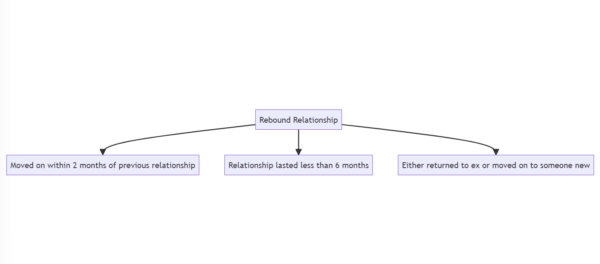
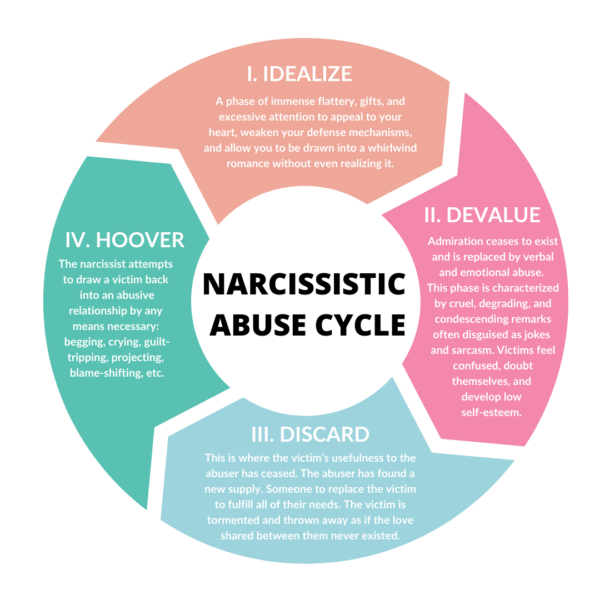
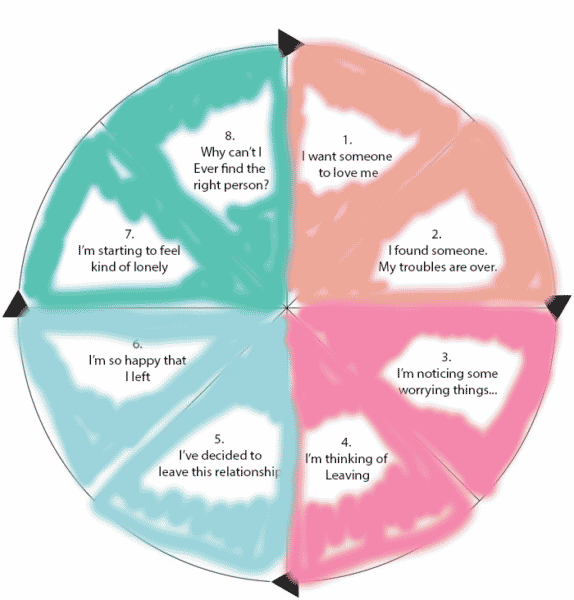

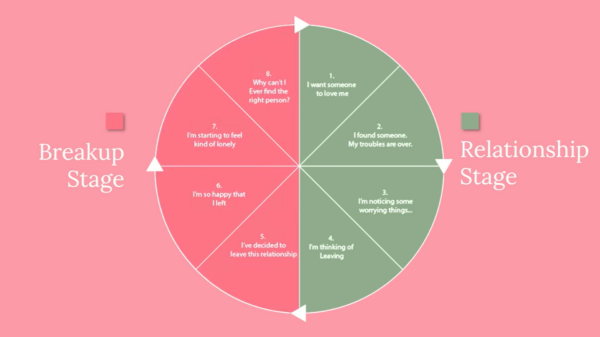
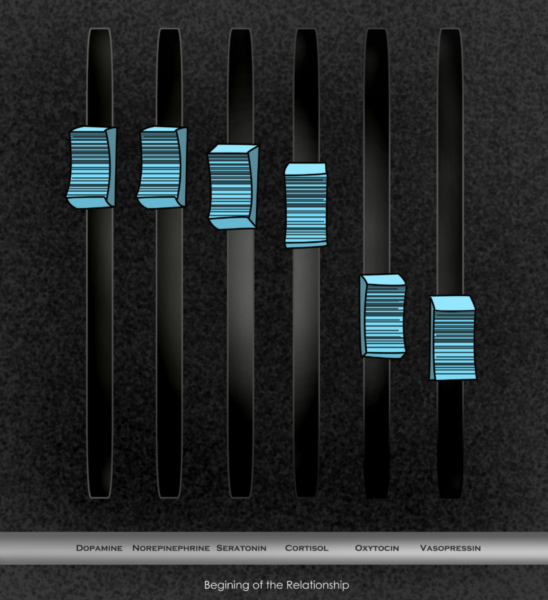
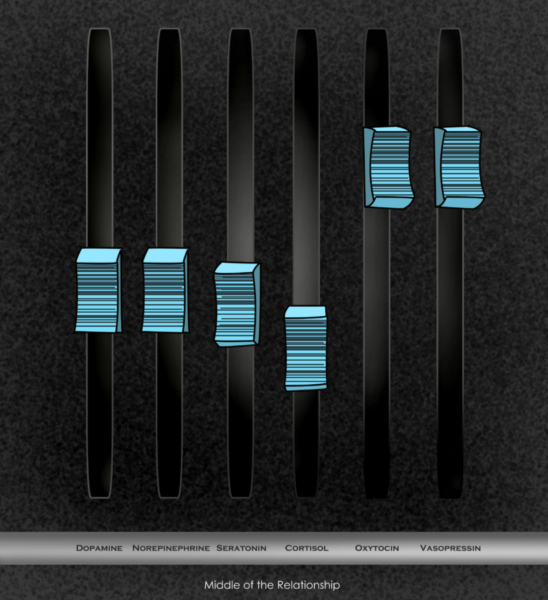
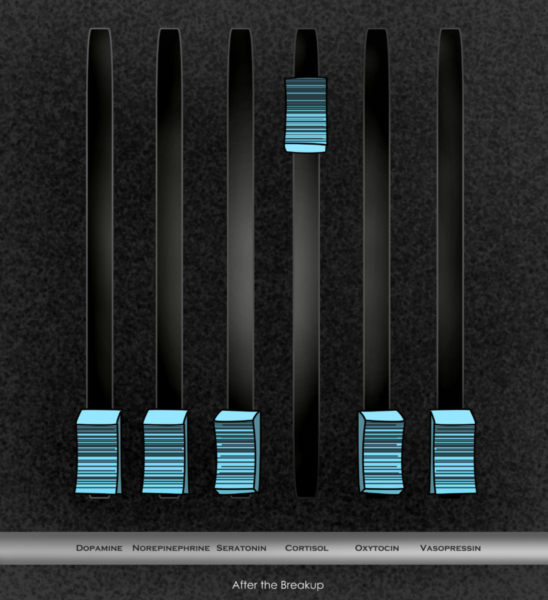
Lauren
August 11, 2024 at 11:10 am
This was so helpful and uplifting and i truly appreciate the research you did on your own to establish some of the data in this article. Much love